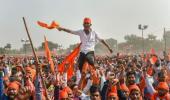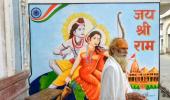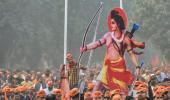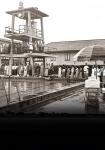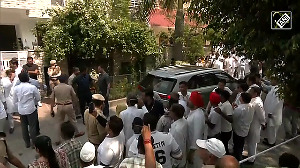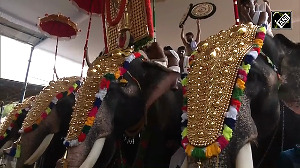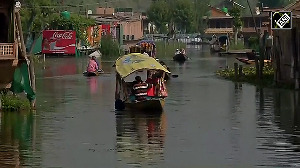'Muslims are happy to have the temple built where the Ram Chabootra once was -- that is at the edge of the outer perimeter of the mosque. That spot too is revered for centuries and the Hindu parties should accept this offer.'
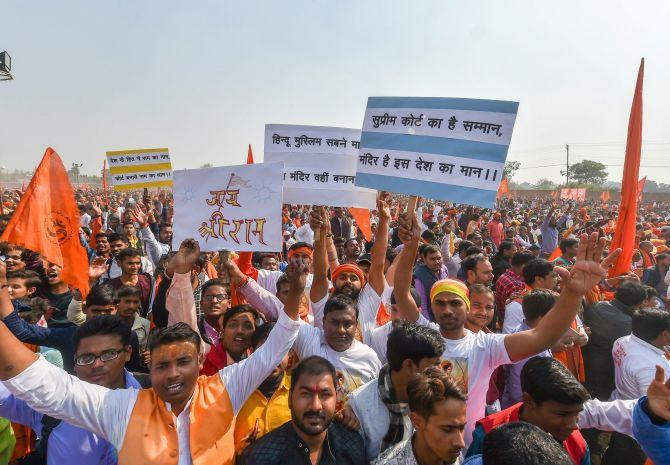
The Supreme Court is to begin hearing into the Ayodhya Ram Janmbhoomi-Babri Masjid land dispute case from August 2 after considering the report of the mediation panel headed by former apex former apex court judge F M I Kalifulla.
As per the SC's order on July 18, the outcome of the mediation process undertaken by the three-member panel would be considered by a five-judge Constitution bench headed by Chief Justice Ranjan Gogoi on August 2 to decide the future course of action.
The panel, also comprising spiritual guru and founder of the Art of Living foundation Sri Sri Ravishankar and senior advocate Sriram Panchu, was earlier granted time till August 15 by the apex court for completion of mediation after its earlier report had said that the mediators were 'optimistic' about an amicable solution, a PTI report said.
Though, as per the SC order, the contents of the report will remain confidential, senior journalist Valay Singh, who recently wrote an authoritative book on the history of Ayodhya, is of the opinion this panel will also meet the same fate as earlier efforts of dialogue and mediation.
In his book, Ayodhya: City of Faith, City of Discord, Singh gives a detailed history of Ayodhya since ancient times to the Ayodhya of today and traces the evidences of Ram worship in the city.
The issue of building a Ram temple at the 'disputed site' once again found its way to the manifesto of the Bharatiya Janata Party in the Lok Sabha elections of 2019, and the bigger mandate in the 2019 polls will certainly push the party to work towards the realisation of this goal.
A few weeks ago, Rashtriya Swayamsevak Sangh chief Mohan Bhagwat had also asked the BJP to keep 'Lord Ram's work' on priority.
In an interview with Rediff.com's Utkarsh Mishra, Singh discusses a possible solution to the long-pending dispute.
"Earnest negotiations without politics is the only way to resolve this dispute peacefully. If a solution is forced upon Muslims there will be irredeemable bitterness," he says.
What impact would a bigger mandate to the BJP have on the Ayodhya issue? Allies like Shiv Sena have already started playing the Ram Mandir card what with Maharashtra elections just round the corner.
The mandate this time is undeniably big. However, as we have seen before, the BJP has always been adept at keeping certain core 'key' issues (to them) alive and simmering for political gain.
That is central to how the party works. Come to think of it, given that the BJP's entire foundation was the Ram temple campaign, it should immediately take steps to resolve the issue.
In any case, the matter is currently in the Supreme Court so in a sense the government has to let due legal process take its course.
All the pressure by allies notwithstanding, the government is a BJP majority government; the allies can at best add some theatrics to bolster their own relevance but it wouldn't have much bearing on the BJP's plans.
It's seasonal. While monsoon winds may or may not bring adequate rain, elections, for the last three decades, have not failed to 'hype' the Ram temple and Ayodhya issue.
This time it is very different of course, but with a severe agrarian crisis and other issues affecting people, it needs to be seen how much traction the Ram temple issue does generate, except in urban centres.
It's interesting, for instance, that in Ayodhya itself, there is opposition to the (Uttar Pradesh) government's plans to go ahead with the Ram statue -- they've earmarked fertile inhabited land for the project without adequate compensation to residents living there for decades.
Naturally, there's distress, particularly for those that had voted for the BJP. It would be interesting to see how issues of religion, livelihood and economics are balanced out, and if it is a zero sum game, who would ultimately suffer the most.
Contrary to expectations, 'Hindu pride' played a big role in the BJP's 2019 campaign. We now have Pragya Thakur as a Lok Sabha MP who managed to get over 60 per cent votes in a city like Bhopal.
Do you feel that things have changed for the worse since 1992, as many say, and now an average Hindu voter has become more communal? If yes, then what could be the consequences of an unfavourable SC verdict in such a scenario?
So far as second-guessing the verdict is concerned, I was once told by a retried high court judge involved in the Ayodhya matter that no court would pass an order that is unenforceable.
It's certainly become harder to uphold the rule of law in our country, and we often see flagrant violations of laws; the worst part is that there is no accountability, the law enforcement system is unable to do its own job.
What about the case against BJP leaders and others for demolishing the mosque, which led to nationwide riots in which thousands died? What's happening to that case? Why are we not interested in that?
Senior BJP leaders willingly and knowingly incensed crowds. Laws were brazenly broken on December 6, 1992. And the mob destroyed not just the mosque but the Ram Chabootra too where Hindus had been worshipping peacefully.
What we lost that day was so much more than just a mosque. This act tore into the pluralistic secular fabric of our country and established a frenzy mob-like mentality, the culmination of which we are witnessing today in the form of mob violence.
The Ayodhya issue is a shameful example of repeated violations of law going unaddressed.
Have we become communal? Most certainly. In times of economic downturn and social upheaval, finding a scapegoat to divert attention to has been a historical political strategy.
Among Hindus the fear of the 'Other' is being drilled night and day by the communal agenda of certain groups, and they are helped in that by pliable and compliant media owners.
Seen in the context of neo-liberalisation, we are seeing in every community a much stronger and toxic identity-based assertion which can never be good for India.
As someone who has studied the issue in great detail, how do you explain the Allahabad HC order of 2010 (external link) that granted larger portion of land to the Hindus? Why couldn't the Waqf Board prove that the land was its property before 1949?
The Sunni Waqf Board have gone to Supreme Court with the plea that the high court did not decide its case for declaration of title of the disputed property.
The Allahabad high court's verdict has been challenged in the Supreme Court by 14 parties, eight of these are Hindu parties, the remaining six are Muslim.
Muslims want their case to be heard as original suit and they want the court to decide who owns the piece of land where the Babri mosque stood.
Contrary to this, the pro-Ram temple parties' case is an appeal against the high court judgment. We must remember that in 2010, the HC did not decide ownership of the disputed site, instead it did a three-way division of land in which 2/3rd went to Nirmohi Akhara and the deity Ramlalla Viraajmaan.
The question that also needs to be asked is, why couldn't the two Hindu sides come together instead of filing separate appeals against the 2010 HC verdict, but instead we are only shown that Muslims alone are obstructing.
Why do you think mediation efforts have not succeeded? Do you think Sunni Waqf Board or Babri Masjid Action Committee are rigid on the matter and not seeking a practical solution?
After speaking to both sides it is clear that negotiations are not likely to be successful. Also, in this latest effort, one of the mediators has been vocal about his views beforehand -- I am talking about (Sri Sri) Ravi Shankar -- so is he impartial?
The Muslim parties say they cannot give away land that is part of Waqf (property) and Hindu parties are adamant on building the temple at the exact spot where the Babri mosque stood.
Mediation means both sides have to sacrifice something. Muslims are happy to have the temple built where the Ram Chabootra once was -- that is at the edge of the outer perimeter of the mosque.
That spot too is revered for centuries and the Hindu parties should accept this offer.
If the court verdict proves unfavourable to the Hindu side, there is always the promise of an ordinance to nullify the ruling. Doesn't this automatically and unfairly load the dice against one side?
The BJP is inching towards a majority in the Rajya Sabha after which it could well bring an ordinance to build a Ram temple, but will it do that remains to be seen.
The rationale behind the judicatory process is that there will be one party who wins, and one who loses. But in this case no one wants to be the loser. So, in your view, what can be the win-win solution that is acceptable to all disputants, given that you've heard ample arguments from all stakeholders in the matter?
Earnest negotiations without politics is the only way to resolve this dispute peacefully. If a solution is forced upon Muslims there will be irredeemable bitterness. And justice must be not only be done but seen to be done.
What is the dominant feeling among locals in Ayodhya about the matter -- Hindu and Muslim both? Do they want a solution one way or the other?
Baatcheet and Bhaichara (dialogue and brotherhood) can resolve the dispute is an oft-heard refrain in Ayodhya.
However, the fact is that the situation is so vitiated with politics that locals have no say in the matter. In fact they have been irrelevant to the issue since at least 1984.
People of Ayodhya want development with or without the temple. Similarly many of them want the dispute resolved one way or another.
They no longer want their town's present, future and past be hostage to the Babri Masjid-Ram temple issue.
A fact that you also mention in the book, that nobody today talks of rebuilding the mosque. It is either the temple or a school or hospital or something like that. Do you think civil society and people who call themselves 'liberal' failed to seek justice in the case?
As I mention in the book, the Congress and the BJP both have failed the people. The mosque needs to be rebuilt if we are sincere about resolving the issue.
One thing that struck me while reading the book was the fact that the government-appointed priest of the temple removed the idols in time on December 6, 1992, otherwise they also would've been a part of the rubble, much like the Ram Chabootra.
Why don't the Left or the liberals use this to take on Hindu nationalists, that they in fact insulted the deity by this deed?
I am very happy that you read the book. I have tried to bring out these many layers of not just Ayodhya's ancient and medieval past but also of its modern history.
For instance, how many people know that the idol of Ram was forcibly placed inside Babri mosque in the intervening night of December 22-23, 1949?
How many of us know about Ayodhya's rich Buddhist past or that nowhere does the ASI (Archaeological Survey of India) report say that there was a Ram temple, it only claims that there was 'a temple', but given the history of that region that temple could be Jain too.
Though there is some overlap, Left-liberals must not be confused with Communist parties and the Congress. Those parties have played their own politics over this issue and other issues.
But civil society, academics, active citizens, and many others have consistently said that the matter should be resolved fairly through dialogue.
In my view, as citizens we should be pointing out the duplicity of both the right and the left.
